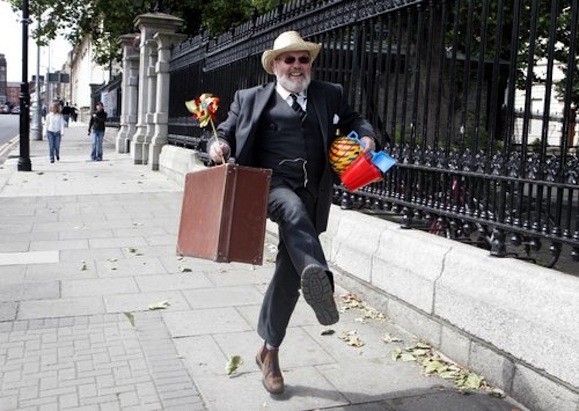The shocking news leapt across the airwaves and sped along the Internet – the Irish, by national vote, had declared gay marriage equal to the straight version. Gay marriage, something virtually unknown just a few years ago, had been approved as fully lawful and valid within the borders of the Irish Republic. Had been approved, not just by a majority of Irish voters, but by nearly two-thirds of them, many of them old men and old women, residents of rural areas who had grown up in hidebound circumstances – in a newly independent country that nearly all observers viewed as conservative in the extreme, sexually repressive, socially reproving, and hideously conventional.
How on earth did Ireland become the first country on earth to allow such a thing, not by a decision of its judiciary, nor by a vote of its parliament, but by popular election, by the decision of a grand majority of its citizens? How have we so misunderstood the Irish as to presume that such a moment could never come to pass? That the Irish, of all people, would never lead the world in such a manner?
A few moments after the news hit the airwaves I received a joyous email from an American friend, the biographer Donald Spoto, who moved to Denmark years ago when he married his Danish husband. He wrote: “I have always believed, contrary to the evidence provided by so many fake Irish ‘religious’ men in the U.S.A., that the people of Ireland are essentially humane, compassionate and sensible people.” Donald had the misfortune to be born to a pathologically cruel woman and a man who was rarely there. His sanity, his centeredness, perhaps even his life were saved by a community of religious women, nearly all of whom had Irish surnames. He knows the difference between genuine religion and fake.
The Irish may get many things wrong, but they are compassionate even toward those who are exceedingly unlike themselves. They have an almost instinctive sense that sooner or later the snow must fall on us all, that, as Joyce writes at the close of Dubliners, his great collection of short stories, the snow falls “through the universe…upon all the living and the dead.”
It is this belief in the essential oneness of all humanity that has for many years given us Dublin’s Saint Patrick’s Day parade, an exercise in wild universality, welcoming everything and everyone – and, therefore, much more fun than New York City’s Saint Patrick’s Day Parade, which only this year welcomed for the first time one small gay group of paraders. The woeful absences of so many others cannot be attributed to Irish up-tightness so much as to American Puritanism. Otherwise, why would the Dublin parade welcome us all, while the New York parade looks down its nose?
The monumental model of compassion in Irish culture is, of course, Saint Patrick himself, the fifth-century apostle to Ireland. As his beloved Irish converts were being snatched away to Britain by pirates and forced into slavery, Patrick was left at the shore to mourn their plight: “In sadness and grief, shall I cry aloud. O most lovely and loving brethren and sons whom I have begotten in Christ, what shall I do for you?…The wickedness of the wicked has prevailed against us.”
Patrick’s compassion reaches its acme when he considers the plight of the Irish women forced into slavery: “But it is the women kept in slavery who suffer the most – and who keep their spirits up despite the menacing and terrorizing they must endure.” Such clear sympathy for the plight of women is virtually unique at this stage of human history. Patrick is also the first human being in history to speak out unequivocally against slavery. Nor will any voice as strong as his be heard again till the seventeenth century.
It is Irish compassion that wins out in the end over all other virtues, however fine those may be. Such compassion, such grand compassion – especially toward those whom others deem outcasts – in the end conquers all, perhaps even death itself, to follow us, whoever we are, however outcast, beyond the Joycean snow, even beyond this world, as Patrick in his imagination followed his stolen and slaughtered Irish children toward ultimate dignity: “O most dear ones…I can see you, beginning the journey to the land where there is no night nor sorrow nor death…. You shall seize the everlasting kingdoms, as he himself promised, when he said: ‘They shall come from the east and the west and shall sit down with Abraham and Isaac and Jacob in the kingdom of heaven.’” ♦
The Last Word:
Who the Irish Really Are


Leave a Reply